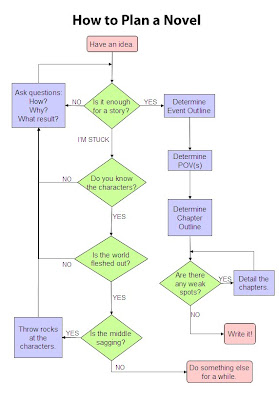Tension is what drives a story. Without it, a story is just a bunch of stuff that happens. Not just the story, but the synopsis and query too. You need tension everywhere.
Tension is whatever the reader is afraid will happen. Morpheus might die. Greg might lose the respect of his future father-in-law. Julianne might not get married and/or might ruin her best friend's wedding.
In my own writing, I've realized places where I don't know what happens next are boring because there's nothing to be afraid of anymore. The trick is, in every chapter and every scene, to ask, "What's the tension here? What is the reader afraid will happen?" and then crank it up.
Make Me Care
In order for the reader to be afraid for the characters, they have to care about them. Have you ever watched a horror movie and wanted the bad guy to kill every last one of them? That's probably because you didn't care about the characters, so you didn't care when their lives were in danger.
It's the difference between strangers in an accident vs. your wife and kids. To make the reader care about the characters, they need to be believable and
sympathetic.
Back Up Your Threats
Good parents know not to make empty threats. A kid who stops when Dad says no is one who has ignored Dad before and been punished.
In fiction, give the reader what they're afraid of, and make it worse than they feared. In
Mrs. Doubtfire, Daniel wasn't just caught in the act, he was caught in a public place, in front of his boss, his ex-wife,
and her boyfriend.
What if you can't back it up? Everybody knows the good guy (usually) never dies. If you want the reader to be really afraid, try this: kill someone the reader thought was safe. Joss Whedon did this in
Serenity. George R. R. Martin does it in every freaking book, and now I'm afraid for
everybody.
Crank It Up
So the reader cares about your characters, they know you'll back up your threats, now it's time to crank up the tension. Except at the end, and maybe at the very beginning, there should be
some tension at all times. The amount might rise and fall throughout the story, but it should generally increase until the climax, when everything goes BOOM.
There are lots of ways to do this. One is by
raising the stakes.
The Incredibles starts with Bob in danger of losing his job, then his life, then his whole family. Crank, crank, crank.
Another way to raise tension is by putting the protagonist in increasingly precarious situations. Notice how in every movie where the protagonist is pretending to be two people, there's always a scene where both people are supposed to be present at once? This is what they're doing.
If the protagonist is safe at home, force them out. If the last place they want to go is their ex-boyfriend's party, make them go to the party. Never give them a break. Ask "What's the worst that could happen?" and make it happen. Your characters will hate you, but fortunately, they're fictional.







